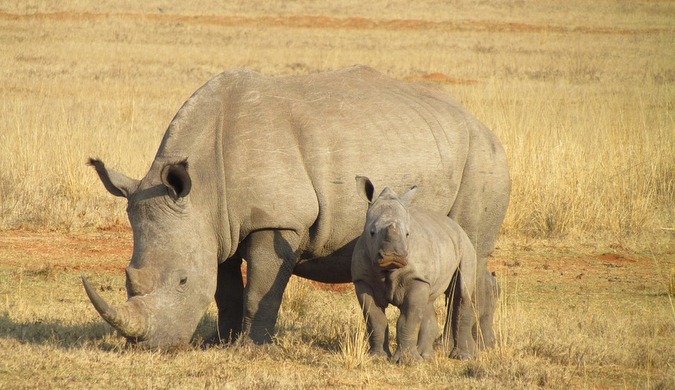
Controversial South African rhino breeder, John Hume, has said that he is on the verge of bankruptcy and may have to sell off his 1,626 southern white rhinos, or risk them being poached due to lack of funds required to provide heavy security at his property.
Hume has the largest number of privately owned rhinos in the world, almost all of them being southern white rhinos, currently listed as ‘Near Threatened’ by the IUCN Red List. These are monitored and protected at the 8,000 hectare Buffalo Dream Ranch (BDR), near the North West province town of Klerksdorp in South Africa.
Hume is probably best known for challenging the South African government’s moratorium on the domestic trade in rhino horn (an extended legal case that he eventually won in 2017), and holding the world’s first legal rhino horn auction.
Over the past 26 years, Hume has invested US$100 million of his own savings into his rhinos. Currently, at least R5 million (US$ 400,000) is spent per month on field protection, feeding, and veterinary expenses. Financial difficulties have now arisen, and as Hume has not been able to generate sufficient funding from the sale of rhino horn, his life savings will be completely exhausted in August of this year.
A press release and email circulated by Hume on 19 June 2018, said that he wanted “to find a wealthy partner to purchase up to 50% of the project”, who would then help him to secure cooperation from the South African government to sell rhino and rhino horns. However, according to Hume rhino horn is essentially impossible to sell in South Africa and there is a risk to selling live rhinos due to the dangers of poaching.
“If I am unable to sell a share in this project in its current form, I believe that I will be forced to sell it off in pieces of between 500 and 1,000 hectares, all having between 100 and 200 rhinos per rhino farm… The problem with this is that most of the buyers would not be able to breed or protect as effectively as I have done with the project as a whole over the past decade,” Hume said.
BDR has recently had to give notice to the private army of soldiers who currently protect their rhinos, as they can no longer afford their services. To maintain the heavy security required to protect the rhinos, an alternate electronic security solution needs to be installed to replace this army, otherwise the rhinos will be at risk to poaching.
In order to prevent this inevitability, Hume and the BDR have appealed to the public for monetary support through their Indiegogo campaign, where their goal is to raise the sum of US$3,300,000 (R38 million), which will all go towards the installation of the early-warning security system.
Hume’s appeal for monetary assistance has been backed by an article by Dr John Hanks – a staunch Hume supporter, and former director of the Africa Program for WWF International (based in Switzerland).
In his article, Hanks said that Hume “is in urgent need of substantial financial support, as are other private land-owners, who together are responsible for approximately 7,000 rhinos (according to Pelham Jones, the Chairman of the Private Rhino Owners Association) more than the rest of Africa combined”.
The moratorium on the legal trade in rhino horn has deprived Hume of an income since the ban was introduced, but Hanks believes that lifting such a ban will benefit Hume and those who require financial support.
“John Hume believes that captive breeding projects are vital to help save rhinos from extinction and that rhinos could pay their own survival with a legal trade in rhino horn. However, until we change the law that currently benefits criminals we need your help to keep John Hume’s project alive and help his mission to save rhinos for future generations,” said Hanks.
Simon Espley, CEO of Africa Geographic, says that he “doubts that the public will come to Hume’s assistance, because of the attritional nature of his campaign to date – his PR machine has not tread lightly on people with counter opinions”, and he “hopes that Hume is able to save his rhinos when and if he runs out of money, by perhaps donating them to restocking programs in safer areas. This would be a very lengthy and difficult exercise, but so worth the effort!” He continued that “Hume appears to be a successful businessman (with historical access to US$100m in personal savings), with excellent networks in the moneyed world. Hopefully, some of his support networks will come forward to bankroll his operation until the rhinos can be relocated. I am sure that a man who loves rhinos as much as Hume would want to see them saved if all else fails.”
To comment on this story: Login (or sign up) to our app here - it's a troll-free safe place 🙂.![]()






